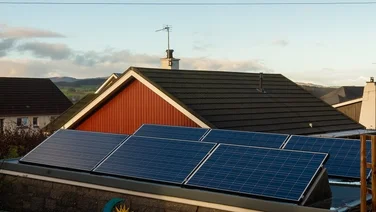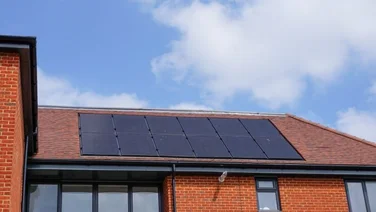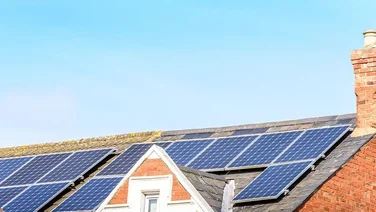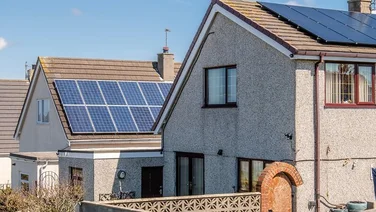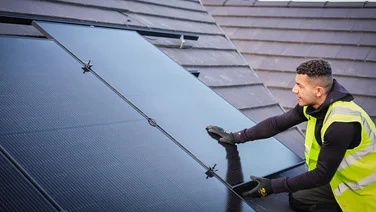- What’s on this page?
- What are the steps to becoming a solar panel installer?
- How much does it cost to become a solar panel installer?
- How long does it take to become a solar panel installer?
- What is the average salary of a solar panel installer?
- Which companies are offering solar panel installer training?
- Is there currently a high demand for solar panel installers?
- Summary
✔ There are over 1,550 MCS-certified solar installers in the UK
✔ You can become a qualified installer through courses or apprenticeships
✔ It can take between two and three years to become fully qualified
The global energy industry is at a turning point, as nations gradually switch from dirty fossil fuels to clean green energy.
As this transition continues, more opportunities in the renewable energy sector will become available – especially in the wind and solar markets.
But there are already plenty of opportunities available in the UK’s solar industry. The list of best solar panels in the UK is growing, as is the list of installers. In fact, there are over 1,550 MCS-certified companies containing in the UK that employ solar panel installers.
And with more investment getting channelled into the renewable industry, there’s never been a better time to get qualified as a solar panel installer. Luckily, you can do this pretty easily – and we’re here to show you how.

What’s on this page?
What are the steps to becoming a solar panel installer?
There are a number of routes you can take to becoming one of the best solar panel installers around, but you’ll need to be qualified as an electrician before you can specialise in solar panel installations.
We’ve listed the two main ways you can get qualified below.
College course
One of the most popular ways to become a solar panel installer is to attend a college course, such as a Level 2 or 3 Diploma in Electrical Installation, which will help you gain the necessary knowledge and skills.
To get onto a level 2 course, you’ll need two or more GCSEs (or equivalent) at grades 9 to 3 (A* to D), and for a level 3 course, you’ll need four or five GCSEs (or equivalent) at grades 9 to 4 (A* to C).
Once you’ve qualified in electrical installation, you’ll then need to take an additional, specialised course to train in solar panel installation.
Apprenticeship
If college isn’t for you, there are other ways you can become a solar panel installer. You can always complete an electrical installation apprenticeship, which usually takes about two years to complete.
As an apprentice, you’ll be fully employed by a company and expected to work a minimum of 30 hours a week, whilst also completing an academic training course.
To qualify for an electrician apprenticeship, you’ll need to be over the age of 16 and have at least four GCSEs (or equivalent) in grades 9 to 4 (A* to C), including English and maths.
How much does it cost to become a solar panel installer?
The cost of becoming a solar panel installer varies, depending on the courses you attend.
For example, a City & Guilds Level 3 course in the Installation of Small Scale Solar Photovoltaic Systems can provide electricians with the know-how when it comes to installing domestic solar panels, but it’ll set you back £725.
The British Plumbing Employers Council (BPEC), on the other hand, provides similar qualifications and training courses for different fees, such as:
- BPEC Solar PV Installers Course – Lasts up to five days and costs £608
- Domestic Electrical and Solar PV Package – Lasts up to 23 days and costs £2,400
And once you’re fully qualified as a solar panel installer, it’s worth getting MCS accredited, which reassures customers that your installation skills and knowledge is up to the highest standard. Initial applications for this cost £100, and you’ll also have to pay an annual fee of £390.
How long does it take to become a solar panel installer?
If you’re starting from scratch, it can take between two and three years to become a fully qualified solar panel installer, as you’ll need to spend about two years training as an electrician, plus added time gaining solar panel installation qualifications.
Each solar installation course takes a different amount of time to complete – with some only taking five days, and others taking a few weeks.
What is the average salary of a solar panel installer?
The typical solar panel installer can earn anywhere between £17,000 and £36,000 per year.
This salary range fluctuates depending on the hours you work, the company you work for, your level of experience, and your location.

Which companies are offering solar panel installer training?
Lots of companies offer solar panel installer training – but you want to make sure you do a legitimate course that has authority behind it.
If your end goal is to become an MCS-accredited installer, you’ll need to sign up for one of the MCS-approved training courses, which include:
- Solar photovoltaic (NOS mapped) – Provided by the BPEC
- Level 3 Award in the Installation of Small-Scale Solar Photovoltaic Systems – Provided by the Specialist Awarding Organisation for Engineering and Manufacturing (EAL)
- Level 3 Award in the Installation and Maintenance of Small Scale Solar Photovoltaic Systems (IMSSSPV) – Provided by the LCL Awards
A lot of solar panel installation companies also offer apprenticeships, so it’s worth keeping an eye out for these on job boards.
Is there currently a high demand for solar panel installers?
There are roughly 44,965 electrician businesses in the UK, compared to only 1,550 MCS-certified companies with solar panel installers. Although this is enough for today’s demand, we’ll certainly need more installers in the coming year as solar panels get more popular.
In fact, we’re already seeing an increased demand for solar panel installers.
Roughly 79,560 solar installations were completed between January and August in 2022 – a 30% increase on the 61,431 installed during the whole of 2021. The UK also saw a 144% increase in installations in August 2022, compared to the previous year.
And with UK energy bills increasing dramatically, more people are predicted to switch to solar energy in the next few years. So why not get ahead of the game and get qualified now?
Summary
Becoming a solar panel installer won’t happen overnight – but the hard work will pay off.
Whether you’re going through the training or apprenticeship route, you’ll be one of the in-demand solar panel installers in the UK, as we continue to ramp up our renewable energy capacity.



